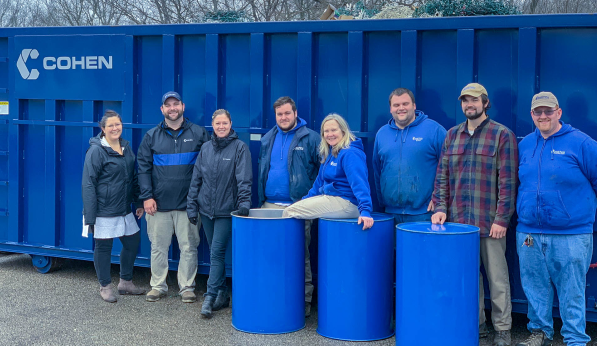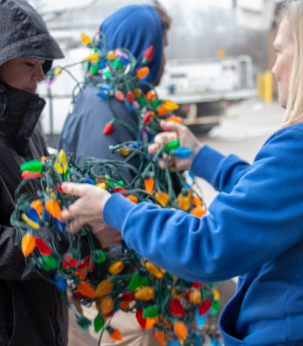18,000 Acres, 85% of land conserved as natural areas
Conservation
Comprehensive Master Plan
Sustainability
Preserving and protecting natural resources
Sustainability Strategic Plan Natural Resource Management Plan [pdf]
Sustainability is a guiding value at Great Parks. We incorporate it into all decision-making and day-to-day processes and extend opportunities to educate the public about the importance of natural resource conservation and ways to live a more sustainable lifestyle. In 2024, Great Parks adopted its first Sustainability Strategic Plan to formalize our commitment to sustainability.
2030 District Network
The 2030 District Network's vision is to establish a global network of thriving, high-performance building districts and cities, uniting communities to catalyze transformation in the built environment and its role in mitigating and adapting to climate change.
In June 2021, Great Parks designated three destinations to be part of the 2030 District Network: Winton Center, Sharon Center and Little Miami Golf Center. These destinations were chosen based on their unique services and the desire to improve efficiency in operational emissions, water consumption and transportation emissions at each by the year 2030.

2030 District Network
28 Million square feet across Greater Cincinnati is committed to reducing the environmental impact of building construction and operations.
Energy
Goal: Reduce energy use by 50% at Great Parks’ 2030 District member destinations.
Currently, finite energy sources known as fossil fuels (natural gas, oil, coal) power most buildings, systems and vehicles in the world. Unfortunately, burning fossil fuels for energy negatively affects the environment and human health. Great Parks has an opportunity to be a leader in reducing energy consumption, minimizing its impact on the grid and facilitating a path to meet 2030 District reduction objectives.
Water
Goal: Reduce building-level water usage by 50% at Great Parks’ 2030 District member destinations. Protect and conserve water resources and aquifers.
Great Parks has over 213 miles of waterways, including 25 miles of waterfront along four major rivers. As the effects of climate change intensify, managing stormwater will become increasingly important to minimize damage to our lands, communities and river and stream systems. Great Parks is committed to conserving surface water resources for wildlife habitat and filtering and recycling water for use where appropriate. These water bodies are an infrastructure to our region, providing habitat for various plant and animal species, drinking water, irrigation and many more uses. Protecting and restoring these features demonstrates how people can work with natural processes to generate healthy waterways and viable ecosystems that positively serve all life.
Success Stories
Great Parks completed an MEP audit in August 2023 to identify the utility baselines for each 2030 District destination. It also allowed for an update to the inventory of existing MEP equipment, its associated efficiencies and determined potential increases in efficiency and related reductions in utility use.
Great Parks has reduced its fleet overall, replacing older, less efficient vehicles with hybrid models. The fleet is 12% hybrid, with additional vehicles planned for purchase in the next few years. When practical, Great Parks is replacing carts and equipment utilizing internal combustion engines with all-electric utility carts and hybrid or electric equipment, including all-electric off-road vehicles to assist with natural resources management tasks.
Great Parks is testing a moisture meter at The Vineyard Golf Course to reduce water consumption and save labor on hand watering and studying the use of a water retention and penetration agent at Little Miami Golf Center. This agent will reduce utility consumption up to 30% (water and electric) and reduce chemical treatments needed for poor turf conditions and turf diseases.
Great Parks installed a 176-panel rooftop solar array at the Winton Woods Central Services maintenance building in 2016. The 52-kilowatt system is expected to generate an annual average of 63,000 kilowatt hours of energy, reducing the facility’s annual energy consumption by 95% and offsetting approximately 2.5 million pounds of carbon dioxide over the next 25 years.
In December 2024, Great Parks brought a second, 46-panel solar installation online at Mitchell Memorial Forest. To-date, this installation has produced 4.5 megawatts of renewable energy and has offset this site’s energy consumption by 95%.
Winton Woods Campground
The Winton Woods Campground Office, built in 2009, features many green building practices, such as geothermal heating and cooling, dual flush toilets, sensor faucets, high-efficiency hand dryers, recycled metal roofing (reflective material decreases energy costs for cooling), certified lumber and wood products and rain gardens to filter parking lot runoff.
Miami Whitewater Forest Campground Shower Building
The Miami Whitewater Forest Campground shower building incorporates many green features, such as low-flow plumbing fixtures, energy-efficient lighting fixtures, natural lighting, high-efficiency water heaters, a water bottle filling station, green building materials and low-VOC paints and adhesives.
Great Parks partners with:
- Queen City Commons and GoZERO to divert food waste
- Rumpke Recycling to divert more than 65 tons of recycling annually
- Cohen Recycling to divert electronic waste and holiday lights
- Cincinnati Recycling and Reuse Hub to divert plastic film
- Matthew2Ministries to divert old uniform pieces
Great Parks practices "mindful mowing" in the park’s public areas. Reducing the amount of mowing reduces associated fuel and labor costs, which can be directed towards more detailed care of our many recreational facilities and outdoor education areas. These more natural areas also serve as woodland, meadow and grassland habitats for local wildlife.
Great Parks is a proud leader of the regional Taking Root reforestation campaign. The initiative was created in response to the ongoing threat to our region’s trees created by hostile bugs, invasive plants and destructive fungi. By planting trees, we reduce the threat and help grow a healthy and diverse tree environment. Great Parks pledged to plant 60,000 trees by 2016 as part of the overall goal of two million for the region by 2020. On October 22, 2016, Great Parks exceeded that goal by planting its 100,000th tree. Since then, the total has risen to approximately 137,000 trees planted.
Bioswales were installed at Winton Woods and the dog parks at Otto Armleder Memorial Park and Miami Whitewater Forest. Rain gardens were installed at Winton Woods, Shawnee Lookout, Farbach-Werner Nature Preserve and Sharon Woods. These spots serve as filters for stormwater water to keep pollutants out of our local streams, rivers and lakes.
Recycle With Us!
Electronic Waste Recycling Events
Date: Friday-Sunday, Nov. 22-Dec. 8; nightly, Dec. 13-23 & 31
Time: 5 p.m. - 9 p.m.
Location: Winton Woods Farm & Equestrian Center
Ages: All Ages
Purchase Tickets
Recycle With Us!
Electronic Waste Recycling Events
Date: Friday-Sunday, Nov. 22-Dec. 8; nightly, Dec. 13-23 & 31
Time: 5 p.m. - 9 p.m.
Location: Winton Woods Farm & Equestrian Center
Ages: All Ages
Purchase Tickets
Cell Phone Recycling
In partnership with Eco-Cell, Great Parks offers drop-off locations for old or broken cell phones and smartphones. Drop off locations are available at:
- Glenwood Gardens
- Cotswold Visitor Centre - 10397 Springfield Pike, Cincinnati, OH 45215
- Little Miami Golf Center
- Little Miami Golf Course Clubhouse - 3811 Newtown Road Newtown, Ohio 45244
- Miami Whitewater Forest
- Visitor Center - 9001 Mt. Hope Road Harrison, OH 45030
- Miami Whitewater Forest Golf Course
- Clubhouse - 8801 Mt. Hope Road Harrison, OH 45030
- Sharon Woods
- Sharon Centre - 11450 Lebanon Road Sharonville, OH 45241
- Sharon Woods Golf Course
- Clubhouse - 11355 Swing Road Sharonville, OH 45241
- Winton Woods
- The Mill Course Clubhouse - 1515 W. Sharon Road Cincinnati, OH 45240
- Meadow Links & Golf Academy
- Clubhouse - 10999 Mill Road Cincinnati, OH 45240
- Woodland Mound
- Seasongood Nature Center - 8250 Old Kellogg Road Cincinnati, OH 45255
- The Vineyard Golf Course
- Clubhouse - 600 Nordyke Road Cincinnati, OH 45255